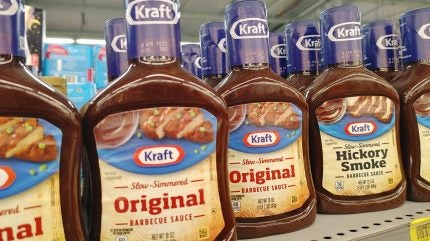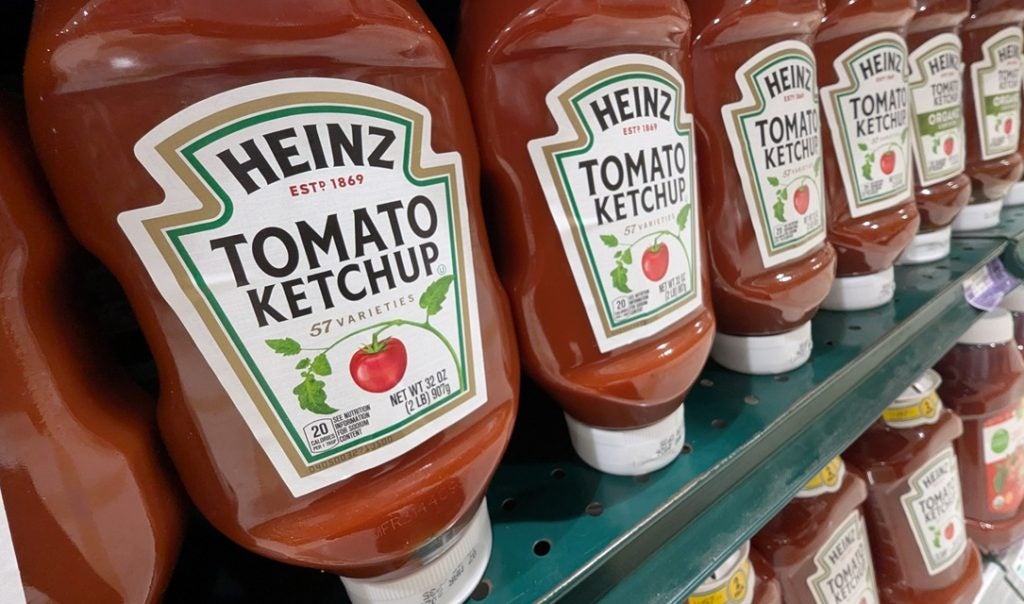
Given Kraft Heinz’s ongoing difficulties in growing its top line, the news the US food and drinks major is weighing its options isn’t the biggest surprise.
But what comes next for the Heinz ketchup and Jell-O desserts owner remains the subject of some speculation among Wall Street analysts.

Discover B2B Marketing That Performs
Combine business intelligence and editorial excellence to reach engaged professionals across 36 leading media platforms.
On Tuesday, Kraft Heinz put out a brief statement, revealing the company is considering “strategic transactions to unlock shareholder value”. The deliberations have apparently been going on for months.
“At Kraft Heinz, our goal has always been to make high-quality, great-tasting food for all and to keep consumers at the forefront of all we do, enabling us to drive profitable long-term growth and value creation,” Kraft Heinz CEO Carlos Abrams-Rivera said. “Consistent with this goal, over the past several months we have been evaluating potential strategic transactions to unlock shareholder value. As we look to the future, we will continue to inspire and delight consumers with our iconic brands, fulfilling our mission.”
Abrams-Rivera is into his second year as Kraft Heinz CEO, having moved into the top job at the start of 2024. He joined the company in 2020 after four years at the then Campbell Soup Co. and another four at Mondelez International. Abrams-Rivera’s career has, in a way, come full circle, with his CV including more than a decade at the former Kraft Foods Group from 1998 to 2010. He succeeded Miguel Patricio as Kraft Heinz CEO after the Portuguese stabilised the company somewhat after a troubling period for the baked beans and soup manufacturer.
However, despite Patricio’s efforts to get Kraft Heinz on firmer footing, Abrams-Rivera faced challenges upon taking the hot seat, not least seeing if he could return the company’s closely-watched volume/mix sales metric to growth. So far, that has proved elusive.

US Tariffs are shifting - will you react or anticipate?
Don’t let policy changes catch you off guard. Stay proactive with real-time data and expert analysis.
By GlobalData2024 was another year in which Kraft Heinz’s sales declined across a number of metrics and it was 12 months Abrams-Rivera described as “challenging” when the company reported its annual results in the February. Kraft Heinz’s top line, Abrams-Rivera said, was “below our expectations”, though he sought to accentuate the positives. “We remained disciplined in protecting profitability, while driving industry-leading margins, generating strong cash flow, and returning $2.7bn in capital to stockholders.”
However, the first quarter of the new year also proved tough, with net sales dropping 6.4% on a reported basis in the first quarter of 2025 and declining 4.7% in organic terms to just shy of $7bn. In the three months to 29 March, operating income decreased 8.1% to $1.2bn. Net income stood at $712m versus $801m a year earlier.
Alongside the first-quarter numbers, Kraft Heinz also cut its 2025 outlook across a range of metrics to factor in the potential upward pressure on input-cost inflation from changes in tariffs.
“There can be no assurance that the company’s assessment process will result in any transaction, or any assurance as to its outcome or timing,” Kraft Heinz said in its statement on Tuesday.
“The company has not set a timetable for completion of this process and does not intend to make any further announcements regarding the process unless and until it determines that further disclosure is appropriate or necessary.”
The prospect of more Kraft Heinz disposals
However, Kraft Heinz’s announcement sparked speculation on Wall Street about the different options the company could consider.
And, after a series of stories in recent years about Kraft Heinz looking at disposals – and managing to find buyers for some assets – it was understandable the reaction among analysts centred on the possibility of more parts of the company being divested.
Robert Moskow, an analyst covering Kraft Heinz at investment bank TD Cowen, said he took the company’s announcement “to mean more divestitures”.
Moskow, who believes Kraft Heinz should “slim down” its portfolio, said it was TD Cowen’s “understanding” the company “has considered selling coffee and meats in the past”, although he noted it was “unclear at this time whether today’s announcement marks an acceleration in these efforts”.
Last year, The Wall Street Journal and Reuters said the company was exploring a sale of its Oscar Mayer meat-products business.
In 2019, it was reported Kraft Heinz was trying to sell its Maxwell House coffee brand but struggling because of what appeared to be an inflated price tag.
When weighing up what Kraft Heinz may now look to offload, it’s critical to understand how the company groups its assets together. Kraft Heinz has shuffled its assets into three groups dubbed ‘accelerate’, ‘protect’ and ‘balance’.
At the CAGNY investment conference in Florida in February 2024, Kraft Heinz outlined the attributes of each group. The ‘balance’ side of the business includes the business’ meats, cheese and coffee brands. It was said to enjoy “high” market shares but margins were deemed to be “low” in “flat” categories. Private-label was also described as “high, with exposure to commodity-driven volatility”.
“We believe the company will prioritise selling brands in the ‘balance’ platform of its portfolio, representing about 24% of sales,” Moskow said. “In the same [CAGNY] presentation, they also described coffee, meats, and cheese as low on ‘market attractiveness’ and meats and coffee as low on ‘right to win’.”
Bernstein analyst Alexia Howard echoed Moskow’s thoughts, pointing to brands like Oscar Mayer and Lunchables. She suggests the sales of Lunchables have suffered in the wake of research by US non-profit Consumer Reports that led to the removal of the brand from school-lunch menus.
“Oscar Mayer and Lunchables, which former CEO Mr. Miguel Patricio considered a highly strategic part of the portfolio, given its protein-rich products and potential to create a stepping stone to more healthy longer-shelf life refrigerated snacks like P3 protein packs and beyond, now seem to be weighing the portfolio down,” Howard said.

Bigger transactions
In her a note to clients, however, Howard also put forward the idea of a couple of bolder moves.
“A somewhat larger scale idea could be to spin-off the faster-growing legacy Heinz business,” she suggests, estimating that part of Kraft Heinz represents around a quarter of the company’s total sales.
When Kraft Foods Group and HJ Heinz combined a decade ago, a central rationale – as per the then playbook of 3G Capital – was “cost synergies rather than any deeper strategic logic”, Howard said. “With Kraft Heinz now trading at just 8.8x next-twelve-months EBITDA, it could be argued that a faster-growing Heinz might be valued by the market at a higher multiple than the base Kraft business but obviously cost dis-synergies could be dilutive.”
On a grander scale, Howard also outlines another scenario: a combination with another major US-centric food group such as General Mills or Conagra Brands.
The prospect of further consolidation in the US food industry has been the subject of much chatter since Mars’ move for Kellanova last year and the macro backdrop could, Howard suggests, provide the conditions for similar deals.
“The US packaged food sector is still the most fragmented space among staples sectors in the developed world and a merger of equal activity could occur as top- and bottom-line pressures play out,” Howard says.
“Past deals suggest that the average expected level of cost synergy from mergers is around 8% of the acquired company’s sales in overlapping regions, which suggests that for US-centric food companies, a lot of money is being left on the table. Such a boost to EPS growth could be very attractive for a set of companies that are currently struggling with multiple headwinds including rising consumer interest in longevity and hence shunning of heavily-processed foods, which is being exacerbated by both RFK Jr.’s Make America Healthy Again initiative as well as the arrival of GLP-1 weight-loss drugs.”
Larger-scale consolidating transactions would provide a greater opportunity for cost savings and we believe Kraft Heinz would be well suited for integrating businesses
Matthew Smith, Stifel
Stifel analyst Matthew Smith has similar thoughts. “[The US packaged-food industry’s] fundamentals remain challenged primarily by weak consumption trends across centre-of-store categories,” he said. “While we believe Kraft Heinz and peers are focused on smaller transactions in the near term to improve their portfolios, we believe the likelihood of an investment cycle and margin reset is building.
“Larger-scale consolidating transactions would provide a greater opportunity for cost savings and we believe Kraft Heinz would be well suited for integrating businesses leveraging its investment spending over the past five years and track record of unlocking productivity savings.”
And it is important to note Kraft Heinz, while very likely to be considering offloading assets, could also be in the market for smaller acquisitions, too. It would be wrong to say the company has solely shedded assets in recent years. Businesses in Brazil and Turkey have been added to the portfolio. Condiments, sauces and snacks could be areas Kraft Heinz’s management might evaluate, Smith suggests. “Kraft Heinz already holds high market shares in these platforms and the gross margin and expected growth rates of the categories are attractive,” he adds.
Kraft Heinz also said on Tuesday representatives of Berkshire Hathaway, the investment vehicle owned by Warren Buffett, were stepping down from the company’s board. Berkshire Hathaway owns just over 27% of Kraft Heinz.
The group said the departures “are not the result of any disagreement with management or the board related to the company’s operations, policies or practices”.
Might another change be the exit of Berkshire Hathaway from the Kraft Heinz share roster, especially as Buffett is set to step down as the investor’s CEO this year? Berkshire Hathaway came on board at the time of the 2015 deal that created Kraft Heinz. Ten years on, we could be set to see more significant change at one of the world’s largest food and drinks manufacturers.





